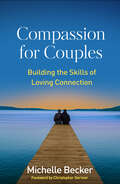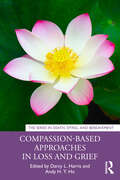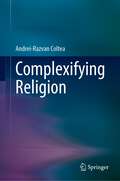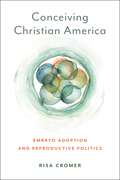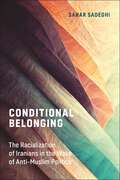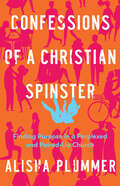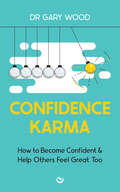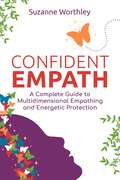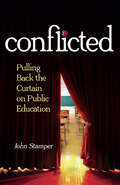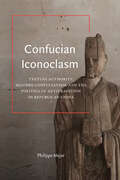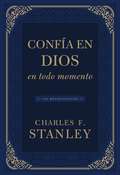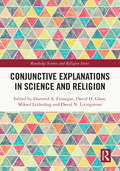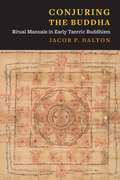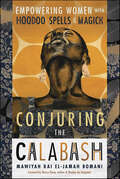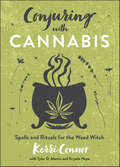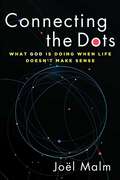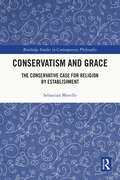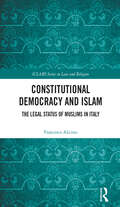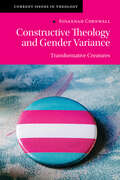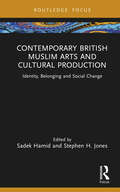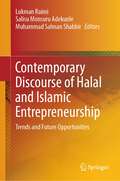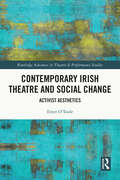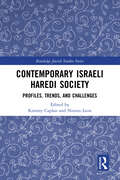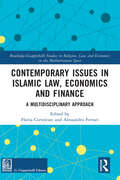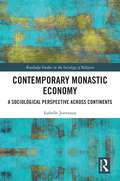- Table View
- List View
Compassion for Couples: Building the Skills of Loving Connection
by Michelle BeckerHow resilient is your relationship? Do you and your partner go into "reactivity mode" when a conflict arises? Do you wish you were closer and more connected? We all need healthy, secure relationships in order to thrive/m-/but they can be hard to build and maintain. Where do you start? According to marriage and family therapist Michelle Becker, the answer is with yourself. By learning to practice self-compassion, you are better able to respond to your partner with love and acceptance/m-/even when they inevitably cannot meet your every need. This caring and insightful guide shows you how to stop defaulting to feelings of annoyance, disappointment, or detachment. Instead, using techniques from Becker&’s renowned Compassion for Couples program (plus guided meditation practices with accompanying audio downloads) you will learn mindfulness, compassion, and other skills that bring you closer to your partner and enrich your lives together. For happy couples looking to strengthen their relationship, or those facing obstacles, Becker leads the way to greater trust, mutual understanding, and a renewed sense of warmth.
Compassion-Based Approaches in Loss and Grief (Series in Death, Dying, and Bereavement)
by Darcy L. Harris and Andy H. Y. HoCompassion-Based Approaches in Loss and Grief introduces clinicians to a wide array of strategies and frameworks for engaging clients throughout the loss experience, particularly when those experiences have a protracted course. In the book, clinicians and researchers from around the world and from a variety of fields explore ways to cultivate compassion and how to implement compassion-based clinical practices specifically designed to address loss, grief, and bereavement. Students, scholars, and mental health and healthcare professionals will come away from this important book with a deepened understanding of compassion-based approaches and strategies for enhancing distress tolerance, maintaining focus, and identifying the clinical interventions best suited to clients’ needs.
Complexifying Religion
by Andrei-Razvan ColteaThis book provides an original and challenging perspective of religions as abstract complex adaptive systems, using an interdisciplinary approach to try to understand what religions are and how they function, two fundamental issues which, despite an intense struggle from several fields, have not yet been resolved. What is the source of religious belief? How do religions work and what are they made of? Why is religion so important for us that it has survived centuries of scientific progress and secularization? Why are people religious even outside religion? The book addresses these questions using an interdisciplinary approach that seeks to untangle the Gordian knot of defining religion. In short, they can be considered entropy-reducing technologies. What differentiates them from other meaning-producing systems is their configuration which employs specific building blocks as tools for mitigating entropy, which are also subsystems and combine in various ways to build a unique configuration: rituals, myths, taboos, supernatural agents, authority, identity, superstitions, moral obligations, afterlife beliefs and the sacred. As a reaction to perturbances or pressure, systems can collapse. Inspired by Nicholas Nassim Taleb, it is, in this book, referred to as fragility—the negative reaction of systems to random events, and four parameters can be used to evaluate it in religious systems: monotonicity (the inability to learn from past mistakes), coupling (linking with other systems: such as political or economic), centralization and stress starvation. Several case studies are provided in order to test the theoretical claims made in this book, based on the author's field research in Romania, Japan, North Korea and Mongolia, and offering details that could be of interest to casual readers, students and researchers of religion.
Conceiving Christian America: Embryo Adoption and Reproductive Politics (Anthropologies of American Medicine: Culture, Power, and Practice)
by Risa CromerWinner of the 2024 Eileen Basker Memorial Prize from the Society for Medical AnthropologyHow embryo adoption advances the Christian Right’s political goals for creating a Christian nationIn 1997, a group of white pro-life evangelical Christians in the United States created the nation’s first embryo adoption program to “save” the thousands of frozen human embryos remaining from assisted reproduction procedures, which they contend are unborn children. While a small part of US fertility services, embryo adoption has played an outsized role in conservative politics, from high-profile battles over public investment in human embryonic stem cell research to the overturning of Roe v. Wade. Based on six years of ethnographic research with embryo adoption staff and participants, Risa Cromer uncovers how embryo adoption advances ambitious political goals for expanding the influence of conservative Christian values and power.Conceiving Christian America is the first book on embryo adoption tracing how this powerful social movement draws on white saviorist tropes in their aims to reconceive personhood, with drastic consequences for reproductive rights and justice. Documenting the practices, narratives, and beliefs that move embryos from freezers to uteruses, this book wields anthropological wariness as a tool for confronting the multiple tactics of the Christian Right. Timely and provocative, Conceiving Christian America presents a bold and nuanced examination of a family-making process focused on conceiving a Christian nation.
Conditional Belonging: The Racialization of Iranians in the Wake of Anti-Muslim Politics
by Sahar SadeghiA compelling account of how race and politics have affected Iranian immigrants in the United Statesand GermanyIranians have a complex and contradictory relationship with race. Though categorized as “white” by the US census, many Iranian Americans remain marginalized, and experience racial and political stigma daily. On the other hand, Iranian Germans who have been in Germany for decades, and are typically regarded as 'good foreigners,' continue to experience marginality and discrimination illustrating the limitations of integration and citizenship. Conditional Belonging explores these apparent contradictions through a comparative analysis of the Iranian diasporic experience in the United States and Germany, focusing particularly on the different processes of racialization of the immigrants.Drawing from eighty-eight interviews with first- and second-generation Iranians living in California and Hamburg, Sahar Sadeghi illuminates how international events, global political policy, and national social climates influence the extent to which Iranians define themselves as members of their adopted nations. All these factors lead to radically different experiences of belonging, or more specifically “conditional belonging,” for Iranians living in Western nations—while those in America might have situational access to whiteness, this is not always available to Iranians in Germany. The combination of these experiences results in perceptions, narrations, and experiences of what the author calls “being but not belonging.” Conditional Belonging is an important and timely book that broadens our understanding of how unpredictable and fluid a sense of belonging to a country can be.
Confessions of a Christian Spinster: Finding Purpose in a Perplexed and Paired-Up Church
by Alisha PlummerEncourages, challenges, and orients singles and ministry leaders to the role of the unmarried in churchBeing single in today's church often feels like a waiting game. You're put on hold in ministry, service, even spiritual growth until you say "I do," and you're either pitied or not seen at all. Unlike today's church, God is not mystified by the presence of unmarried Christ-followers in the pews. In fact, he has masterful plans for those without a ring on their finger. Alisha Plummer points out how God is eager to empower them with purpose and passion.In Confessions of a Christian Spinster, Alisha explores God's design specifically for Christian singlehood through amusing tales and scripturally based truths. She tackles the difficult questions the church often ignores, like: Where do I fit in? Does the church even want me? Has God forgotten about me? What happens if I never get married? Further, she confronts the church, calling for an adjustment to its couple-centric culture, and asking Christians to understand that their single brothers and sisters are not only valued by God but integral to his kingdom.Singles will feel seen through Alisha's words; they'll be encouraged to seize their role in the church and inspire their pastoral staff to reinvent their culture on singleness. is a powerful resource for those seeking to live and thrive in a perplexed church--and a way forward for the church itself.
Confidence Karma: How to Become Confident and Help Others Feel Great Too
by Gary WoodLeading UK Psychologist Dr Gary Wood reveals his unique take on how to increase your own confidence by building up the confidence of those around you – as karma tells us, what goes around comes around.Confidence Karma provides the ultimate guide to building lasting confidence at work, in your relationships and, in fact, in every aspect of your life. Using practical exercises, anecdotes and questionnaires, psychologist and life coach Dr Gary Wood provides you with realistic, practical and achievable strategies for change. Learn how to:Influence your body language and project your voice to act confidentlyBuild on your existing strengths and skills, and work with what you already do wellIdentify your goals and values, and learn to live in accordance with themDevelop strength and resilience so you can bounce back from temporary setbacksBecome more comfortable pushing yourself out of your comfort zoneStop selling yourself short and appreciate your value to others Confidence Karma not only provides you with all the tools you need to increase your self-worth, it also encourages you to share the confidence. After all, confidence is a social practice – by working on your own, you can help boost other people&’s, and so each chapter ends with a &“karma call&”, asking you to think about how you can apply your new knowledge and skills in making your colleagues, friends and family their most confident selves as well.
Confident Empath: A Complete Guide to Multidimensional Empathing and Energetic Protection
by Suzanne WorthleyPractices for empaths to protect themselves, heal energetically, and discover self-empowerment• Explores different types of empaths and empathing, including sensitive empaths, psychic empaths, and quantum and paranormal empathing• Offers advanced strategies for energetically protecting yourself and your loved ones• Looks at the connection between limiting beliefs and empathic behaviors, including how to release limiting beliefs and how empathic behaviors are connected to the health of your energy fieldThere is no doubt we are living in a time of significant global upheaval and change. Yet psychic empath Suzanne Worthley, a highly skilled professional intuitive energy practitioner, shares how as an empath you can still live an empowered life, energetically protect yourself and your loved ones, and contribute in a meaningful way to creating a more positive, life-affirming reality on every level of dimension. Starting with the basics of human energy systems, Suzanne explores different types of empaths, the three expressions of empathy, and the differences between empathy and sympathy—and why one is truly helpful and the other limiting. You will learn how to identify and release different types of limiting beliefs, both learned and programmed into our beings. You will also discover how to prevent unwanted energy transference and learn the fascinating skill of empathing buildings, land and the natural world, and other dimensions. Confident Empath delves into aspects of empathing not often explored, such as quantum and paranormal empathing, soul contracts, and advanced empathing strategies. Interspersed throughout the guide are extraordinary and compelling true accounts from Suzanne&’s professional work that illustrate the concepts taught: from encountering intermingled timelines from the 1800s to a healing investigation that walked through the holographic history of a more than 100-year-old brothel.
Conflicted: Pulling Back the Curtain on Public Education
by John StamperAt what point can a Christian teacher no longer be part of a public education system that requires them to participate in teaching destructive ideologies and advancing immoral agendas on young children? John Stamper reached that tipping point as a teacher in the Chicago Public School System and made the decision to quit his job and pull back the curtain on what’s happening in public schools today. You’ve seen the stories on the news – our national education system has an agenda, being implemented under the guise of fairness, equality, and racial justice to children. However, this book will open your eyes to: The indoctrination process through mandatory teacher training that implements these radical ideologies in schools without parental knowledge The danger and division created by critical race theory and gender theory being promoted in public schools How Marxist, socialist, and communist ideologies are dominating public schools, and how you move forward with homeschooling your children For generations, teachers have been excellent role models, investing their time and energy into fundamental lessons. However, today a growing number think they, the school board, and their school system know more than parents about what should be taught to students. You need to know what is going on in your child’s school and be prepared for the conflict of values that you may have to face. You have options.
Confucian Iconoclasm: Textual Authority, Modern Confucianism, and the Politics of Antitradition in Republican China (SUNY series in Chinese Philosophy and Culture)
by Philippe MajorConfucian Iconoclasm proposes a novel account of the emergence of modern Confucian philosophy in Republican China (1912–1949), challenging the historiographical paradigm that modern (or New) Confucianism sought to preserve traditions against the iconoclasm of the May Fourth Movement. Through close textual analyses of Liang Shuming's Eastern and Western Cultures and Their Philosophies (1921) and Xiong Shili's New Treatise on the Uniqueness of Consciousness (1932), Philippe Major argues that the most successful modern Confucian texts of the Republican period were nearly as iconoclastic as the most radical of May Fourth intellectuals. Questioning the strict dichotomy between radicalism and conservatism that underscores most historical accounts of the period, Major shows that May Fourth and Confucian iconoclasts were engaged in a politics of antitradition aimed at the monopolization of intellectual commodities associated with universality, autonomy, and liberty. Understood as a counter-hegemonic strategy, Confucian iconoclasm emerges as an alternative iconoclastic project to that of May Fourth.
Confía en Dios en todo momento: 365 devocionales (Devotionals from Charles F. Stanley)
by Charles F. StanleyEste devocional de 365 días del querido autor y pastor Dr. Charles Stanley te inspirará para ver cómo Dios transforma nuestros corazones y nuestras vidas cuando confiamos en Él con un futuro desconocido. Confiar en Dios en tiempos difíciles puede ser un reto, pero trabajar para hacer crecer esa confianza día a día nos proporciona una alegría y una paz mayores de las que jamás podríamos encontrar apoyándonos en nuestro propio entendimiento. En Confía en Dios en todo momento, el Dr. Charles Stanley nos anima a creer en el amor de Dios y a descansar en Su propósito para nosotros.Cada entrada de este devocional diario incluye un versículo bíblico, una oración y una enseñanza inspiradora. Página a página, tu alma encontrará descanso al recordar que:No importa lo que ocurra en el mundo o en tu vida, Dios es fielPuedes liberarte de la ansiedad y descansar en Dios cuando dejes de intentar resolverlo todo por ti mismoConfiar en Dios día a día te lleva al contentamiento y la satisfacción mientras Él endereza tus caminosConfía en Dios en todo momento es un regalo maravilloso para Navidad, Pascua, cumpleaños y graduaciones, o para cualquiera que anhele confiar en Dios más profundamente en un mundo incierto hoy y todos los días.Trusting God With TodayThis 365-day devotional from beloved author and pastor Dr. Charles Stanley will inspire you to see how God transforms our hearts and lives when we trust Him with an unknown future.Trusting God in difficult times can be a challenge, but working to grow that trust day by day brings greater joy and peace than we could ever find leaning on our own understanding. In Trusting God with Today, Dr. Charles Stanley encourages us to believe in God's love and rest in His purpose for us.Each entry in this daily devotional includes a Bible verse, a prayer, and inspirational teaching. Page by page, your soul will find rest as you remember that:No matter what is happening in the world or in your life, God is faithfulYou can release anxiety and embrace God's rest as you stop trying to figure it all out yourselfTrusting God one day at a time leads to contentment and satisfaction as He makes your paths straightTrusting God with Today makes a wonderful gift for Christmas, Easter, birthdays, and graduations, or for anyone who longs to trust God more deeply in an uncertain world today and every day.
Conjunctive Explanations in Science and Religion (Routledge Science and Religion Series)
by David N. Livingstone David H. Glass Mikael LeidenhagThis book investigates the nature and relevance of conjunctive explanations in the context of science and religion. It explores questions concerning how scientific and religious explanations for features of the world or phenomena within it relate to each other and whether they might work together in mutually enriching ways. The chapters address topics including the relationship between Darwinian and teleological explanations, non-reductive explanations of mind and consciousness, and explanations of Christian faith and religious experience, while others explore theological and philosophical issues concerning the nature and feasibility of conjunctive explanations. Overall, the contributions help to provide conceptual clarity on how scientific and religious explanations might or might not work together conjunctively as well as exploring how these ideas relate to specific topics in science and religion more generally.
Conjuring the Buddha: Ritual Manuals in Early Tantric Buddhism
by Jacob P. DaltonRitual manuals are among the most common and most personal forms of Buddhist literature. Since at least the late fifth century, individual practitioners—including monks, nuns, teachers, disciples, and laypeople—have kept texts describing how to perform the daily rites. These manuals represent an intimate counterpart to the canonical sutras and the tantras, speaking to the lived experience of Buddhist practice.Conjuring the Buddha offers a history of early tantric Buddhist ritual through the lens of the Tibetan manuscripts discovered near Dunhuang on the ancient Silk Road. Jacob P. Dalton argues that the spread of ritual manuals offered Buddhists an extracanonical literary form through which to engage with their tradition in new and locally specific ways. He suggests that ritual manuals were the literary precursors to the tantras, crucial to the emergence of esoteric Buddhism. Examining a series of ninth- and tenth-century tantric manuals from Dunhuang, Dalton uncovers lost moments in the development of rituals such as consecration, possession, sexual yoga, the Great Perfection, and the subtle body practices of the winds and channels. He also traces the use of poetic language in ritual manuals, showing how at pivotal moments, metaphor, simile, rhythm, and rhyme were deployed to evoke carefully sculpted affective experiences. Offering an unprecedented glimpse into the personal practice of early tantric Buddhists, Conjuring the Buddha provides new insight into the origins and development of the tantric tradition.
Conjuring the Calabash: Empowering Women with Hoodoo Spells & Magick
by Kai EL-Jamah Bomani"This book is about Black girl magick, queer girl magick, straight girl magick, trans magick, bisexual magick. It's about giving yourself the power to be fierce...Black women are Hierophants, Magicians, Empresses, and High Priestesses."—Mawiyah Kai El-Jamah Bomani Authentic and unapologetic, this guide to magical spirituality empowers you to take back the power to heal and shine under your own strength. Written by an accomplished Hoodoo practitioner, Conjuring the Calabash features spells, recipes, and rituals that help you rise out of the constrictions around you.Mawiyah Kai El-Jamah Bomani shows you how to bless your calabash (sacred womb) with love and reawaken your fullest potential through folk traditions, personal stories, and her favorite songs and pop stars. An inclusive and intersectional voice in contemporary Hoodoo, Mawiyah will help you become your fiercest self.
Conjuring with Cannabis: Spells and Rituals for the Weed Witch
by Kerri Connor Krystle Hope Tyler D. MartinShort and Sweet Ways to Enjoy Weed WitcherySharing dozens of spells, rituals, and blessings, Kerri Connor introduces you to the fun and accessible world of cannabis witchcraft. This book covers everything from growing your own plants to using weed in your shadow work, making it an essential resource for taking your practice to a higher level. Kerri, with the help of Tyler D. Martin and Krystle Hope, teaches you how to bless and protect your tools, celebrate the sabbats, enhance your intentions through flowers and herbs, and more.Conjuring with Cannabis provides clear, concise information that practitioners of all levels and paths can use. You'll learn how to unite magic and cannabis for greater focus, stronger energy, better empowerment, and a deeper connection to spirit. A companion to Wake, Bake & Meditate, this book offers you a mind-opening experience.
Connecting the Dots: What God is Doing When Life Doesn't Make Sense
by Joël MalmEverything that has happened to you has prepared you for your greatest days ahead. When you understand the patterns of God&’s work in each season of your life, you can see His faithfulness in making all things work together for the good of His children.What if everything that has happened to you has prepared you for your greatest work? What if those confusing, uncomfortable seasons when you felt like you were walking in circles were actually the path God was leading you on to fulfill the destiny He has planned for you? Connecting the Dots helps you make sense of your life, seeing each day as part of an epic that God is writing. Joël Malm shows you how to detect God&’s work in each season, keeping your eyes lifted to Him who makes all things work together for the good of those who love him.
Conservatism and Grace: The Conservative Case for Religion by Establishment (Routledge Studies in Contemporary Philosophy)
by Sebastian MorelloThis book offers a systematic and detailed examination of the conservative case for religion by establishment. In doing so, the author demonstrates that the conservative political tradition is rooted in an inescapably religious worldview, and in turn shows what the future of conservatism might be. The author begins the book by analysing the thought of prominent proponents of secular conservatism, chiefly examining the work of Roger Scruton. The author develops a case to show that Scruton’s arguments on the privatisation of religion are in tension with his basing of a conservative political settlement on "transcendent bonds". The author then examines alternatives to secular conservatism, especially the chief religious and metaphysical commitments of early conservatives, Edmund Burke and Joseph de Maistre. Finally, in seeking to establish a foundational argument for religion by establishment within the conservative tradition, and more broadly to unify the diverse commitments and objections of conservatives, the author develops a case that draws on Scruton’s personalism, as well as the thought of Martin Buber, Andrew Pinsent, and Robert Spaemann. In the course of developing his foundational argument, the author incorporates findings from experimental psychology and themes from contemporary theology. The result is a convincing argument in favour of establishmentarian conservatism, as well as the role of religious ideas in our self-understanding as individuals and as a political community. Conservatism and Grace will appeal to scholars and advanced students interested in political philosophy, philosophy of religion, theology, and the history of conservatism.
Constitutional Democracy and Islam: The Legal Status of Muslims in Italy (ICLARS Series on Law and Religion)
by Francesco AlicinoThis book outlines the legal status of Muslims in Italy. In particular, it highlights that, when it comes to Islam, the Italian legal system exacerbates the dilemma of contemporary constitutional democracies, increasingly caught between the principle of equality and the right to have rights, which implies the respect of diversity. It provides readers with a deep understanding of how domestic and external socio-political factors may muddle the interpretation of Italy’s constitutional provisions, starting with those relating to state secularism and religious freedom. It is argued that today, as never before, these provisions are torn between the principle of equality and the right to be different. This situation has been exacerbated by incessant states of emergency, from immigration to religion-inspired terrorism, in light of which the presence of Islam in the peninsula has been highly politicized. Italy’s experience on the legal status of Muslims provides an interesting case study and, as such, a valuable source of empirical information for a functioning and pluralistic constitutional democracy, especially when dealing with conditions of fear and insecurity. The book will be of interest to researchers, academics, and policy-makers working in the areas of law and religion, constitutional law, comparative law, and human rights.
Constructive Theology and Gender Variance: Transformative Creatures (Current Issues in Theology)
by Susannah CornwallSome Christians are anxious and uncomfortable about gender diversity and transition. Sometimes, they understand these issues as a rejection of God's intention for creation. Gender diversity has also been assumed to entail self-deception, mental ill-health, and dysphoria. Yet, humans are inherently transformative creatures with a vocation to shape their own worlds and traditions. Transformative creaturely theology recognizes the capacity of gender to shape humans even as we also question it. In this book, Susannah Cornwall reframes the issues of gender diversity and transition in constructive Christian theological terms. Resisting deficit-based discourses, she presents gender diversity in a way that is positive and non-oppositional. Her volume explores questions of the licit limits of technological interventions for human bodies, how gender diversity maps onto understandings of health, and the ethics of disclosure of gender diversity. It also brings these topics into critical conversation with constructive Christian theologies of creation, theological anthropology, Christology, and eschatology.
Contemporary British Muslim Arts and Cultural Production: Identity, Belonging and Social Change (Islam in the World)
by Sadek Hamid Stephen H. JonesThis unique collaboration between scholars, practitioners and Muslim artists profiles emerging forms of contemporary British Muslim art, prompting a debate about its purpose and its inclusion in UK society. It features analysis of Muslim art as a category, as well as reflective accounts of people working in theatre, popular music, the heritage sector and ancient and modern visual arts, often at the margins of the British arts industry. Dealing with sociological and theological themes as well as art history and practice, the volume provides a timely intervention on a neglected topic. The collection discusses diverse topics including how second- and third-generation British Muslims, as part of a broader generational shift, have reworked Sufi music and traditional calligraphy and fused them with new musical and artistic styles, from Grime to comic book art, alongside consideration of the experiences of Muslim artists who work in the theatre, museums and the performing arts sectors. It is a must-read for students and researchers of theology and religious studies, Islamic studies, fine art, cultural studies and ethnic and racial studies.
Contemporary Discourse of Halal and Islamic Entrepreneurship: Trends and Future Opportunities
by Lukman Raimi Salisu Monsuru Adekunle Muhammad Salman ShabbirThis book serves as a valuable resource for Islamic entrepreneurship researchers, Halal scholars, Islamic finance professionals, Halal advocates, and Halal business model consultants in the fast-changing global economy. The thematic focus is not only on Islamic and halal entrepreneurship but also on halal production and consumption, ethics and impact investing in Islamic entrepreneurship, Shariah principles guiding business model innovation and utilisation of disruptive technologies (such as crowdfunding for startups, bitcoin, digital ventures, cryptocurrency, blockchain, among others), Islamic entrepreneurship and SDGs, halalisation and sustainability issues, and emergence of Islamic-Fintech in Muslim majority nations and nations with plural economic systems, including the interface of Islamic and halal entrepreneurship with science, technology, engineering, and mathematics (STEM). At the moment, the working knowledge about Islamic and halal entrepreneurship is at its infancy among Islamic finance professionals, halal consultants, academic researchers, and students nursing the ambition of going into these two fields. Universities, Islamic training academies, and centres are also ill equipped to enrich Islamic and halal curricula with principles and conventional models. One of the proactive ways of breaking financial exclusion, social inequality, and social exclusion caused by apathy and avoidance of Riba, Maysir, and Gharar is by recognising, embracing, and promoting Islamic and halal entrepreneurship among the excluded Muslims and lovers of ethical business models. Overall, this book aims to promote better understanding of Islamic and Halal entrepreneurship in order to assist academics, researchers, practitioners, consultants, and policymakers to improve the growth of Islamic startups and small and medium enterprises (SMEs) by improving social inclusion and financial inclusion and accelerating the attainment of SDG 8 and SDG12.
Contemporary Irish Theatre and Social Change: Activist Aesthetics (Routledge Advances in Theatre & Performance Studies)
by Emer O'TooleThis book uses the social transformation that has taken place in Ireland from the decriminalisation of homosexuality in 1993 to the repeal of the 8th amendment in 2018 as backdrop to examine relationships between activism and contemporary Irish theatre and performance. It studies art explicitly intended to create social and political change for marginalised constituencies. It asks what happens to theatre aesthetics when artists’ aims are political and argues that activist commitments can create new modes of beauty, meaning, and affect. Categories of race, class, sexuality, and gender frame chapters, provide social context, and identify activist artists’ social targets. This book provides in depth analysis of: Arambe – Ireland’s first African theatre company; THEATREclub – an experimental collective with issues of class at its heart; The International Dublin Gay Theatre Festival; and feminist artists working to Repeal the 8th amendment. It highlights the aesthetic strategies that emerge when artists set their sights on justice. Aesthetic debates, both historical and contemporary, are laid out from first principles, inviting readers to situate themselves – whether as artists, activists, or scholars – in the delicious tension between art and life. This book will be a vital guide to students and scholars interested in theatre and performance studies, gender studies, Irish history, and activism.
Contemporary Israeli Haredi Society: Profiles, Trends, and Challenges (Routledge Jewish Studies Series)
by Nissim Leon Kimmy CaplanThis edited volume offers profiles of contemporary Israeli Haredi (i.e., Jewish Ultra-Orthodox) society from several disciplinary points of view, resisting a generalized approach and examining the different, sometimes competing currents, that define it. It is argued that Haredi society has undergone a process of rejuvenation in recent history: demographically, it has experienced steady and consistent growth; on the Israeli political stage, Haredi parties have become increasingly influential; and culturally, the Haredi presence is increasingly felt in Israeli news media, popular movies, and TV series. Each of the chapters in the book focuses on a particular topic and combines research findings with an assessment of the current state of the field. These topics encompass Haredi ideology, politics, military service, education, geography, the media, and healthcare – together, they paint a complex picture of Haredi society as one of contradictory layers, dimensions, and aspects. Making sense of contemporary Haredi society is critical for anyone interested in understanding Israeli society as a whole, but the book will also appeal to historians of religion, scholars of contemporary conservative enclave religious societies and cultures, and those who focus on Jewish studies in the modern era.
Contemporary Issues in Islamic Law, Economics and Finance: A Multidisciplinary Approach (Routledge-Giappichelli Studies in Religion, Law and Economics in the Mediterranean Space)
by Flavia CortelezziThis book explores how Islam can impact the structures and performance of firms, financial institutions and capital markets across a range of countries and industries. The Islamic finance industry represents an important reality not only because of the oil wealth of the Gulf states, which have fueled demand for such financial services, but also for an increased demand from a growing Muslim population in the West that aspires to express a full and all-inclusive religious identity. The increased demand for Muslim financial institutions has prompted Western non-Islamic firms to begin providing these services in an interesting effort of acculturation to the new plural scenario. By adopting a multidisciplinary approach, which also takes into account the theological, legal and geopolitical framework, the book offers a comprehensive picture of Islamic financial tools, contracts and business opportunities. Drawing on different fields of expertise, it deals with various themes, such as the theological roots of Islamic economics and finance and its geopolitical impact; the EU policy of cooperation with MENA and GCC countries; the instruments of Islamic finance, its legal principle and ability to become an instrument for enhancing business opportunities; the functioning of Islamic banks; the development of capital markets within a financial model influenced by religious constraints and, finally, the new relationships of this religious financial system with Western legal systems. The book thus provides a complete and extensive overview of the practice of Islamic finance through the lenses offered by studies of economics and management. Providing a careful analysis and an integrated framework of geo-economic and political issues, the book will be a valuable resource for academics, researchers and professionals in International Business, Entrepreneurship and Small Business Management, Law and Religion and Intercultural Studies.
Contemporary Monastic Economy: A Sociological Perspective Across Continents (Routledge Studies in the Sociology of Religion)
by Isabelle JonveauxThis book examines the economy of contemporary Catholic monasticism from a sociological perspective, considering the ways in which monasteries engage with the capitalist world economy via a model which aims less at ‘performance’ per se, than at the fulfilment of human and religious values. Based on fieldwork across several countries in Europe, Africa and South America, it explores not only the daily work and economy in monastic communities in their tensions with religious life, but also the new interest from society in monastic products or monastic management. With attention to present trends in monastic economy, including the growth of ecology and the role of monasteries in the social and economic development of their localities, the author demonstrates that monastic economy consists not solely in the subsistence of religious communities outside the world, but in economic activity that has a real impact on its local or even more global environment, in part through transnational networks of monasteries. As such, Contemporary Monastic Economy: A Sociological Perspective will appeal to scholars of religious studies and sociology with interests in contemporary monasticism.
